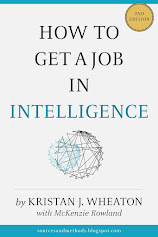On two lists to which I subscribe the question has come up within the last six months, "What is Intelligence?" To be truthful, on one of those lists, it was my own series of posts on the subject that got things going, but the heated discussions on both lists suggest that a certain passion for the issue exists.
While these discussions are often eloquent, they typically rely on persuasive argumentation rather than on empirical data. I want to change all that.
I have designed (and one of our research assistants (Thanks, Kathleen!) has created) a short online survey to gather some data about what kinds of activities are "intelligence-like" and which kinds are not.
Click here to take the "What is Intelligence?" Survey
Clicking on the link above will take you to the survey which contains 14 examples of different kinds of activity. You are asked to rank how closely the described activity matches your own internal definition of intelligence on a scale from 1 to 5 (1 meaning that it does not fit your definition at all and 5 meaning that it fits it extremely well). You don't need to come up with a definition; just read the question and let your instincts guide you.
No personally identifying information will be collected. From the compiled results I expect to be able to spot areas of broad agreement and disagreement so that, in the end, we will hopefully be able to focus the debate somewhat.
What is intelligence? I say, "Let's find out!"
Sunday, October 26, 2008
What Is Intelligence? Let's Find Out! (Online Survey)
Posted by
Kristan J. Wheaton
at
8:34 PM
![]()
Labels: definition, intelligence, survey
Subscribe to:
Post Comments (Atom)





4 comments:
Intelligence; interesting word and an even stranger concept. Can intelligence be defined by a bunch of words,(since it is created by the utterance of words themselves)or does intelligence have some obvious 'life of its own' that allows its definition to be applied to language use also?
So, it seems doubtful that language use alone creates intelligence-even though intelligence is a word. Language creates the label 'intelligence' but if just language use alone equals intelligence then intelligence means very little.
Really Bill?!! Intelligence is the collection, reporting and analysis of information. But is that all? What else can be added to that?
I guess I am just not that much for just listing what others definitions of intelligence might be....Language means something,if it means anything at all, because our memories of our past use of language allows us to invest that which we speak about with, and invent, its meaning, which is the self-same meaning of language. Language must be constricted by its own definitions and limited by its form of use for it to anywhere approach the sciences. It is philosophy and Art! So intelligence is a 12 letter word with a personally variable meaning somewhere within the parameters of each individual speakers experiences (especially their remembered experiences) with language.
Language's symbols do not have the same empirical strengths as do mathematical principle's but their effects can be just as harsh.
I thought I would post this as I feel it tells a better story of how I would define intelligence.
Education and the significance of Life, Jiddu Krishnamurti, (p. 66-68)
Intelligence is not separate from love ...
Jiddu Krishnamurti
Modern education, in developing the intellect, offers more and more theories and facts, without bringing about the understanding of the total process of human existence. We are highly intellectual; we have developed cunning minds, and are caught up in explanations. The intellect is satisfied with theories and explanations, but intelligence is not; and for the understanding of the total process of existence, there must be an integration of the mind and heart in action. Intelligence is not separate from love.
For most of us, to accomplish this inward revolution is extremely arduous. We know how to meditate, how to play the piano, how to write, but we have no knowledge of the meditator, the player, the writer. We are not creators, for we have filled our hearts and minds with knowledge, information and arrogance; we are full of quotations from what others have thought or said. But experiencing comes first, not the way of experiencing. There must be love before there can be the expression of love.
(p. 64, 65)
...
Information, the knowledge of facts, though ever increasing, is by its very nature limited. Wisdom is infinite, it includes knowledge and the way of action; but we take hold of a branch and think it is the whole tree. Through the knowledge of the part, we can never realize the joy of the whole. Intellect can never lead to the whole, for it is only a segment, a part.
We have separated intellect from feeling, and have developed intellect at the expanse of feeling. We are like a three-legged object with one leg much longer than the others, and we have no balance. We are trained to be intellectual; our education cultivates the intellect to be sharp, cunning, acquisitive, and so it plays the most important rôle in our life. Intelligence is much greater than intellect, for it is the integration of reason and love; but there can be intelligence only when there is self-knowledge, the deep understanding of the total process of oneself.
What is essential for man, whether young or old, is to live fully, integrally, and that is why our major problem is the cultivation of that intelligence which brings integration. Undue emphasis on any part of our total make-up gives a partial and therefore distorted view of life, and it is this distortion which is causing most of our difficulties. Any partial development of our whole temperament is bound to be disastrous both for ourselves and for society, and so it is really very important that we approach our human problems with an integrated point of view.
To be an integrated human being is to understand the entire process of one's own consciousness, both the hidden and the open. This is not possible if we give due emphasis to the intellect. We attach great importance to the cultivation of the mind, but inwardly we are insufficient, poor and confused. This living in the intellect is the way of disintegration; for ideas, like beliefs, can never bring people together except in conflicting groups.
As long as we depend on thought as a means of integration, there must be disintegration; and to understand the disintegrating action of thought is to be aware of the ways of the self, the ways of one's own desire. We must be aware of our conditioning and its responses, both collective and personal. It is only when one is fully aware of the activities of the self with its contradictory desires and pursuits, its hopes and fears, that there is a possibility of going beyond the self.
Only love and right thinking will bring about true revolution, the revolution within ourselves. But how are we to have love? Not through the pursuit of the ideal of love, but only when there is no hatred, when there is no greed, when the sense of self, which is the cause of antagonism, comes to an end. A man who is caught up in the pursuits of exploitation, of greed, of envy, can never love.
Without love and right thinking, oppression and cruelty will ever be on the increase. The problem of man's antagonism to man can be solved, not by pursuing the ideal of peace, but by understanding the causes of war which lie in our attitude towards life, towards our fellow-beings; and this understanding can come about only through the right kind of education. Without a change of heart, without goodwill, without the inward transformation which is born of self-awareness, there can be no peace, no happiness for men.
Bill
Post a Comment